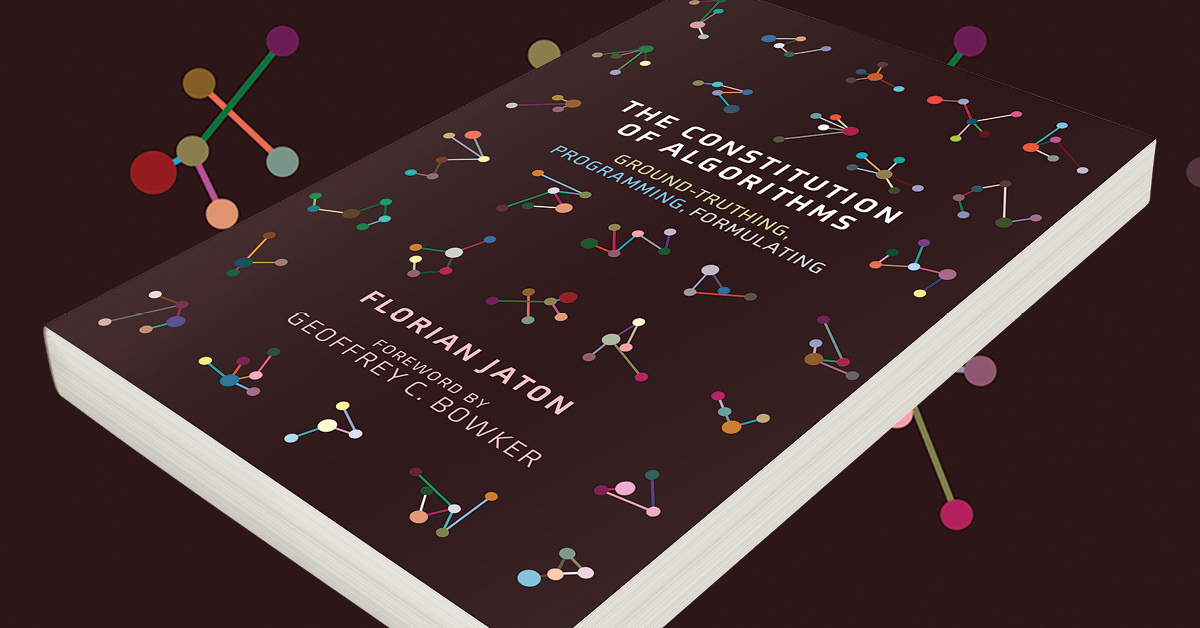|
Jaton F (2025) A critical praise of algorithmic agency: Phased wisdom, isomorphic trueness, and extrinsic intelligence. Keynote lecture at the Futures and GenAI 2.0 symposium, Aarhus University, Aarhus, Denmark, 27-28 November.
Jaton F (2025) Aux origines de ChatGPT: histoire socio-technique d'une évolution algorithmique. Keynote lecture at the Digital Dreams Festival, University of Lausanne, Lausanne, Switzerland, 7 September.
Jaton F (2025) L'appel de l'ISO: Préparer une épreuve de standardisation en génomique computationnelle. Invited speaker at the workshop Génomique et santé, EHESS, Paris, France, 6 June.
Jaton F (2024) A critical praise of algorithmic agency: Phased wisdom, isomorphic trueness, and extrinsic intelligence. Symposium on machine learning inference. Durham University, UK, 28 October.
Jaton F (2024) IA et référence performative: le cas du projet TESLA et des néoantigènes en immunothérapie personnalisée du cancer. Le séminaire du Médialab. Sciences Po, Paris, France, 17 September. [video]
Jaton F (2024) Computational genomics inside out: Certify, standardize, accredit. Professional Datascapes. King’s College London, London, UK, 24-25 June.
Jaton F (2024) IA et référence performative. Le cas du projet TESLA en immuno-oncologie. Intelligences artificielles : une économie politique. Sorbonne Université, Paris, 20 June..
Jaton F (2024) Socio-technical history of Generative Pre-Trained Transformers (GPTs): a primer. Tech Week 2024. Geneva Graduate Institute, Geneva, 4-6 March.
Jaton F (2023) Examining algorithms in the light of their ground-truth datasets: Results, critique, and avenues of reflection. The politics of machine learning evaluation workshop and conference. Institute for Advanced Studies, Amsterdam, 16-17 November.
Jaton F (2023) Enabling ‘AI’? The Situated Production of Commensurabilities Artificial Intelligence as factor and consequence of societal change: Final Conference. Schaufler Lab, TU Dresden, Dresden, Germany, 28-30 September.
Jaton F (2023) On ground truths, biases, and morality in machine learning design and application. NEOMA Research Day: Harnessing the Power of AI, NEOMA Business School, Paris, 2 June.
Jaton F (2023) Groundwork for AI: Enforcing a benchmark for neoantigen prediction in personalized cancer immunotherapy. Robert-K.-Merton-Zentrum für Wissenschaftsforschung's seminar series, Humboldt-Universität zu Berlin/Online, 3 May.
Jaton F (2023) Examining algorithms in the light of their ground-truth datasets: Results, critique, and avenues of reflection. DiPLab Seminar Series, Telecom Paris/Online, 29 March.
Jaton F (2023) What can Lab Studies say about algorithmic life? STS York seminar series, Toronto/Online, 21 March.
Jaton F (2022) Ethiques de l’intelligence artificielle. Analyse terrestre et pistes de réflexion. Journée de formation des Commissions d’éthique de la Suisse romande, Forum Geneva, 24 November.
Jaton F (2022) The constitution of algorithms: What can 'lab studies' say about algorithmic life? ANSO/IHP conference series, Geneva Graduate Institute, 8 November.
Jaton F (2022) Assessing biases, relaxing moralism: On ground-truthing practices in machine learning design and application. NoBias project Summer School, University of Southampton/Online, 6 September.
Jaton F (2022) On ground-truths and biases: A pragmatist take on the morality of machine learning design and application. AI and the Digitalized Society Conference, University of Helsinki, 23-24 May.
Vertesi J and Jaton F (2022) Shaping Science: Janet Vertesi in Conversation with Florian Jaton. The EthnographicCafé, UC Berkeley/Online, 18 March.
Jaton F (2022) The Constitution of Algorithms. Platform Economies Research Network (PERN) Salon Series, The New School, New York/Online, 24 February. [VIDEO]
Jaton F (2022) Assessing biases, relaxing moralism: On ground-truthing practices in machine learning. AI Ethics & Society Lecture Series, University of Edinburgh/Online, 23 February.
Jaton F (2021) On ground truths, biases, and morality in machine learning design and application. Learning (in) Digital Media Lecture Series, Siegen University/Online, 30 Novembre. [VIDEO]
Jaton F (2021) Les processus frictionnels de bancarisation des données : histoire et sociologie des sciences. Invited speaker to the ‘Programme de recherche sur le partage des données qualitatives à l’ère du numérique’ (PARDOQ), UMR Amure/Online, 31 May.
Jaton F (2021) Intérêt des ethnographies de laboratoire pour l’étude des processus algorithmiques. Invited speaker to the CNRS/LISIS conference on computational social sciences, Université Paris-Est Marne-la-Vallée/Online, 18 May.
Jaton F (2020) On ground-truthing activities, and their contribution to algorithmic finance. Invited speaker to the 2020 Symposium on Technology and Finance, King's College London, FinWorks Futures Center, 20 May.
Jaton F (2019) Les algorithmes mis à nu. Une perspective anthropologique. Invited speaker to the round table organized as part of the symposium "La Rencontre entre la Science, le Droit dans le Numérique," Université de Lausanne, Lausanne, Suisse, 14 February.
Jaton F (2018) Why is there ethnography of algorithms at all? With some elements regarding curious entities called “ground truths”. Keynote lecture at “La iniciativa de Tecnología y Sociedad”, Universidad de los Andes, Bogota, Colombia, 26 July.
| 

